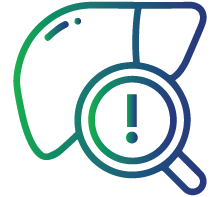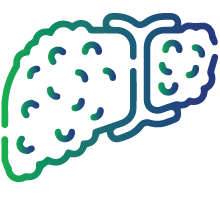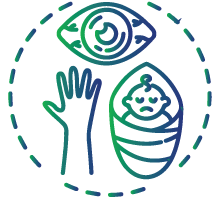
Bilirubin Total, Direct & Indirect Test
Bilirubin Total, Direct & Indirect
The amount of bilirubin in the blood is determined by a bilirubin blood test. The breakdown of red blood cells produces a yellow substance known as bilirubin. Bilirubin is eventually eliminated from the body after passing through the liver. Increased bilirubin levels could be a sign of several liver or bile duct issues. Sometimes increased hemolysis (the breakdown of red blood cells) can also raise bilirubin levels.
Direct, indirect, or total bilirubin are used to express the results of bilirubin tests. The total bilirubin test combines the direct and indirect bilirubin tests.
Doctors can diagnose conditions like jaundice, hepatitis, cirrhosis, gallbladder disease, and hemolytic anemia by checking the bilirubin levels in the blood and urine. Additionally, a blood bilirubin test is used to diagnose newborn jaundice, which, at very high bilirubin levels, can result in kernicterus (a type of brain damage). Thus, getting your bilirubin tested is recommended to screen for and monitor liver diseases.
What is Bilirubin test (Total, Direct, and Indirect) used for?
In case of the following signs and symptoms, a bilirubin test is performed:

Liver damage

Liver disease

Bile duct blockage

Hemolytic anemia

Liver-related metabolic problems

Jaundice in newborns
What Tests are Included in the Bilirubin Total, Direct & Indirect Test?
There are three different types of bilirubin tests
Unconjugated (“indirect”) bilirubin:
-
This is the bilirubin formed when red blood cells are destroyed, and the blood carries it to the liver
Conjugated (“direct”) bilirubin
-
This is the bilirubin after it has been altered in the liver. It moves to the intestines and is then eliminated through feces.
Total bilirubin
-
A total bilirubin is a combination of unconjugated and conjugated bilirubin.
Preparation for the test
Bilirubin blood tests require fasting for up to 4 hours before the test. Some medications can affect the bilirubin test results, so ensure your doctor is aware of what prescription drugs, over-the-counter medicines, or dietary supplements you are taking. Ask your doctor for details about pre-test preparations, and make sure to follow instructions closely.
Interpretation of results
Interpretation of results
|
Parameters |
Normal bilirubin test values |
|
Total Bilirubin |
0.0 - 1.1mg/dL |
|
Conjugated bilirubin (direct) |
0.0 - 0.3mg/dL |
|
Unconjugated bilirubin (indirect) |
0.0 - 1.1mg/dL |
Normal ranges may vary slightly between laboratories, and some laboratories use different measurements.
Deviation from normal levels indicates the following:
· Hemolytic anemia and transfusion reactions can both result in an increase in bilirubin (mainly unconjugated)
· Gallstones, drug reactions, and other bile duct obstructions may all contribute to increased bilirubin (mainly conjugated)
If your liver is temporarily under stress from a new medication or a high alcohol intake, you might have a higher total bilirubin count. Additionally, it might be a sign of acute, chronic, or genetic liver disease caused by viral hepatitis, Gilbert’s syndrome, Crigler-Najjar syndrome, Wilson disease, toxic hepatitis (alcohol-induced or drug-induced), cirrhosis, and chronic liver failure
FAQs
What happens during a bilirubin blood test?
A blood sample is taken from a vein in the arm using a fine needle. This procedure usually takes no longer than five minutes.
What are the risks associated with a bilirubin blood test?
This test involves a negligible risk of infection. There might be slight bruising or tenderness around the site where the needle is inserted
When is a bilirubin urine test done?
A comprehensive urinalysis, a series of tests that examine the components of your urine, may include a bilirubin urine test. If you have obvious jaundice or dark urine, a health care professional may also request a bilirubin urine test. Bilirubin in your urine (bilirubinuria) is caused when your conjugated bilirubin levels are extremely high. Bilirubin should not be present in your urine if you are in good health and your liver is functioning normally
What should you do if you have an abnormal bilirubin test result?
An abnormal bilirubin test result can indicate liver damage caused by conditions like hepatitis, cirrhosis, hemochromatosis, mononucleosis, etc. Bilirubin test results are used to help diagnose your condition or determine the appropriate treatment for you. In some cases, this blood test is not enough to diagnose a specific liver disease and requires further tests, like imaging tests, a liver biopsy, or blood tests for certain viruses, to make a final diagnosis. Your healthcare provider will decide on a suitable treatment plan for you based on your diagnosis
How to lower elevated bilirubin levels?
If the condition that is causing your bilirubin levels to rise can be effectively treated or managed, your levels will drop. Depending on the type of liver damage or disease, your doctor will recommend the appropriate treatment options. Eliminating alcohol and drugs and maintaining a healthy diet will generally lessen overall stress on your liver.

